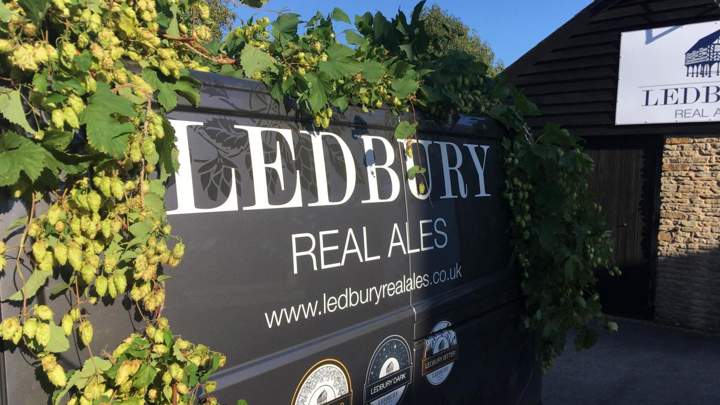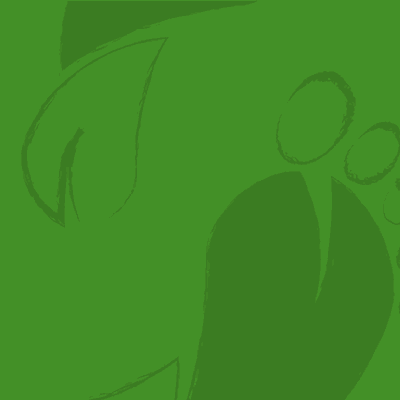
Ledbury Real Ales
Ledbury Real Ales, established in 2012 by Ant and Kate Stevens, is situated just outside of Ledbury on a site which also acts as the family home. Ant and Kate’s focus on a small range of high quality, cask-conditioned real ales is coupled with a passion for local produce (including hops grown in Herefordshire and Worcestershire) and a circular resource economy which sees their brewery waste being recycled or utilized in the nearby area.
Ant shared his time with us to talk about his work inside and out of the brewery, and the challenges and achievements faced within the business.
Can you give us a little bit of a background to start with as to why you've taken steps to integrate sustainability in so many different facets of the organization?
Okay, so I don't know if Kate mentioned I have two jobs. One of my jobs is to run the brewery here in Ledbury with my wife, Kate and seven part time members of staff. In my other job, I'm the head of innovation for an American bank, building and running a voluntary carbon credit marketplace. So my big day job, the one I spend most of my time doing, is purely in the sustainability space.
The piece around the brewery… We live in the middle of the countryside, surrounded by farmers, and we can see hop farms from where we are. We've seen a lot of change within our local environment over the last, well, 15 years that we've been brewing. Next to us was 75 acres of apple trees until recently - it’s been purchased and now it’s just crops for energy production - winter wheat, maize, and barley, going straight into AD plants.
So, we've seen the land change. We've seen our land become boggier because there's no trees soaking up the water, it just runs straight into the field. Those fields are getting lots of heavy machinery on them, which is compacting the soil, making it less attractive for water and other things. We've seen our local environment change, and we wanted to make a positive impact on where we live - not just for us, but for the future, right? For our kids.
Can you tell us about any sustainability actions you’ve already taken, and what the impact has been?
A couple of years ago we were contacted by a chap up in Leeds who I'm now working with on a more on my day job, chap called Dr Toby Green, who is a carbon consultancy firm called Carbon Green. He has helped me understand the brewery’s impacts, not just on emissions, but some more societal stuff as well. [Carbon Green] have an application - there's quite a lot of them around - that allowed us to do carbon calculations. You know, what am I doing? What is my impact on methane production, or on NOx or on CO two emissions? We went through all the scopes. We looked at all our emissions for everything that we do as a business, and that allowed us to then understand our impact purely in terms of emissions. But it also looked at where our wastewater goes, what happens to the grain that we have that post the brewing process, and what do we do with our hops? It allowed us to look at our entire footprint, which is pretty green in the first place, but we wanted to improve on it.
We'd always had solar panels, and we've now put three lots of solar panels in. Over time, we've put some battery storage in. That decision was made because we wanted to use less power - we wanted to use more green renewable power, and we wanted to produce it ourselves, but that had to be a financially positive decision. Putting in the solar and the battery storage over time has allowed us to reduce our energy bill from the grid by over half. Most days we're generating all of our own power. So, that decision becomes a financial decision as well as a sustainability decision.
We then looked at where all that power was being used - we went to the low power LEDs - we switched all of our lighting out, which cut our bill for just the lighting by a huge amount. We have lights on all the time, because there's somebody in the brewery all the time, and we're a very small brewery.
We also have three different cool rooms, so we've expanded one of the cool rooms so that we can switch some of the two other cool rooms off for the majority of the winter period, which has been another decision that's allowed us to cut the amount of cooling that we need to do and keep it into one room. That room has been further insulated which should cut the costs even more.
We've just put in 1.5 acres of trees in our bottom field (we’ve got about 5 acres of meadow land). We brought in somebody from the Woodland Trust to see whether we could put a mini forest in, and brought somebody in from the local meadow trust based in Ledbury who did an analysis on the meadow land and said that the land is pretty unique. Hereford actually has quite a lot of trees, even though a lot of the apple trees have been cut down recently, we're still a very woody county. So they asked us if we keep our meadow land, because there's very little old meadow land around, and we've never had too much heavy machinery on it, and it hasn't been ploughed in years, and it's been used for grazing and cutting for hay, rather than anything else.
We came up with an agreed plan with them, where we've put an old orchard back in to just one of the paddocks, so about an acre and a half - that's going to be alder, and some willow to soak up some of the water that's come off the other fields. And then we've got some old varieties of apple trees, plums and pears, bit of juniper, a little bit of white willow, which are bigger willows. And then because we'd lost a load of trees for some honey fungus, we wanted to put some older varieties back in. So they've just been planted. Some of the fruit is for us, some of the fruit is for the animals, and some of the fruit is for the birds.
We've been tracking the species that we've been seeing and making sure that we've added back in some different types of trees that would allow different species to survive. The species we've really met here are the swifts and swallows, which were all over the place because of the amount of apple trees, and therefore all of the bugs that the swifts and swallows love. But they've disappeared – we don't see those at all now, which is a big shift in the in the last 15 years.
Have you had to draw on a lot of external knowledge?
Yeah I guess I’m a bit lucky with my day job, I'm surrounded by lots of people who are in this space, and lots of farmers, because we buy local hops. And I'm very lucky that we're part of the hop development program within Herefordshire.
Charles Faram, the local hop merchant down in Malvern, they've got a hop development program. Their main development yard is down in Dormington, which is sort of halfway between us and Hereford, and we're part of that development program.
There's a chap in Dormington called Peter Glenn Denning, who's the hop 50 culturalist. He's the guy that produces 10,000 brand new hops every year, and I work closely with him, and Will Rogers, who's the Faram’s rep, to decide which of those early varieties of hops they really like, and when they're at a single plant, we get to do some brewing with them, but they also humour me and bring me into the process.
So I get to sit with the farmers and talk about spraying methods and how does this work, and how does that work, and what trees you need within the local vicinity so that you've got the right type of cross pollination. I'm sort of surrounded by because of the business we're in, but the local farmers have taken us under their wing a little bit because we show an interest in what they do, and we use their hops, and promote them.
But in my day job I'm surrounded by environmentalists who are helping me understand. If I have a question, I can follow them up and say, we're thinking about doing this. Is this good for the environment or is it bad? What's the implications to this? I'm lucky enough I can get access to that knowledge.
What are some of the challenges you’ve faced, or are facing? You’ve mentioned sustainability decisions needing to be a financial one – is that a key factor?
It is, yeah. The payback on the solar - the last lot we put in with the batteries - was seven years. So I've got to assume that I'm brewing for at least seven years just to pay back the money. You know, seven years in the brewery, we've been going 13. Do I hope we go for another seven? Yes, but there's lots of breweries of just shutting down - there's a lot of breweries that have opened and closed whilst we've been around.
The only real breweries that are still around are the big ones around here. There is very little money to be made out of brewing unless you're of a certain size and then there's a different set of scales. I think we're doing it more because we live here, the breweries at home, not on an industrial unit. The power we get is used within the brewery, but the trees we put in the ground, or some of those trees, will take 25 years to mature. I've not done that for me. I've done that for my kids, and I've done that for the local environment, but it's my local environment that I live in, so I think there's a slightly different view.
Can you talk at all about any of the any additional benefits that you might have experienced?
It's funny, we don't really shout too much about what we've done. We haven't put anything out about the trees and the other bits yet, which we'll get around to doing at some stage. It's a funny one, right? I don't think you do these things because you think it's going to drive business. I totally agree with you. If you invest in local that local firm will invest in its local surroundings, and that impacts everybody that lives locally. We only buy hops from local hop farmers, and therefore the money that we get for our beer, we then spend locally with the local farmers and the local merchants. We bought all of our casks from stoke Edith, and all of our stainless steel work goes to a local stainless steel guy as well. So the thing about being local, and the money staying in the local economy, is a big thing.
But I don't think that many people think that when they're buying products. They buy products on price, or they buy product on brand, they generally don't buy product on sustainability... So I'm not sure that doing what we're doing drives business to us, I think we're doing it because it's the right thing for us to do. In terms of benefits, there's definitely a personal benefit to us, of seeing that we're putting the land to better use. There's a personal happiness level to that.
I mean, this is sort of intangible, isn't it? My kids think I'm crazy. ‘Why are you doing this? It's more work and it's money’, and it's like, well, yeah, but you know, these trees will grow as you do, and then they'll be there, and hopefully you'll remember me that we put those things in before you chop them down and use them as fire wood or whatever they're going to do.
Can you share any of your future ambitions/plans in terms of cutting emissions and/or protecting nature?
We've got one more project which we're working on, which is some reed beds. At the moment, the waste-water goes down in some great big tanks and then gets pumped out. We're going to put some reed beds in, which is going to allow the water to be cleansed as it goes through, and additional benefits of the plants and animal species then that come through.
At that point, we've got very little waste from the brewery that's not being recycled. The grain goes to some local pig farmers, the hops go into the compost, the water would be recycled and then be able to use for the cleaning. That is very satisfying to know.
If you were to share a tip or two for businesses that may be looking to cut emissions or look after nature, what would your suggestions be?
It can be really scary to try and figure out, first of all, some of the terms that people use and some of the things look a bit scary. When you're trying to calculate your own emissions, it’s is really not that difficult. There's technology out there you get access to, that you can plug in, how many times you drive the car from A to B, what type of van you've got, how many people come from, where they come, what lights you've got. What your electricity bill is. If you want to make your calculation of your emissions really complicated and scary, you can. But your main emissions are really quite easy to figure out.
Once you understood what your emissions are, you can then decide whether you can make a financial decision to change it. Some of it has got to be financially sound. And those decisions should be relatively easy. Solar panels for us were relatively easy, and with batteries, because we use so much power. If you're doing a lot of driving, you may want to think about getting a newer vehicle. But it all comes down to a financial decision and there’s a payback. And those calculation tools can help you do that really quickly. It doesn't have to be really scary.
Those are the things that I thought when I first started this, that were really scary, and really hard to do, and actually they’re not. We found out really quickly what our main emissions were and how we can think about changing them.
The other bit, the nice bit about managing lands – there’s loads of grants you can get that can help you do those things, for very low costs, if anything. And he's just having the time to find out where those grants are.
I guess the thing that I think is - this doesn’t have to be complicated. You can make little changes very quickly that will impact the environment. And even just changing your light bulbs to LEDs makes a big difference to your power bill and doesn’t cost you a lot of money to do it, so I think the thing is just not to be scared by it. Ask the questions, do the stuff - there are loads of people around that will help - and then make small changes.

